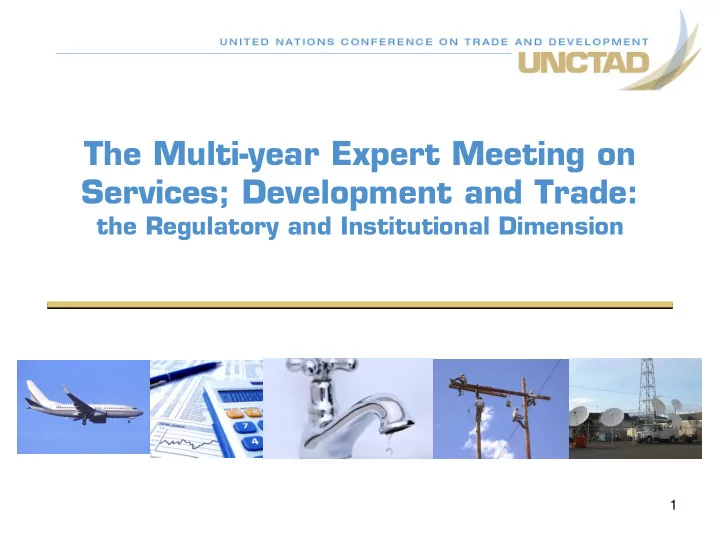

The Multi-year Expert Meeting on Services; Development and Trade: the Regulatory and Institutional Dimension 1
Outline • Objective of the MYEM • Main issues • The achievements of each session • Outputs • Outcomes • Impact 2 2
Objective of the MYEM “ The objective of the multi-year expert meeting is to assist developing countries, especially those in Africa, LDCs and countries with special needs in accordance with the Accra Accord, as well as countries with economies in transition, in establishing regulatory and institutional frameworks and cooperative mechanisms to support strengthening of their domestic services capacity and its efficiency, competitiveness and export capacity .” Accra Accord, para. 94(b) 3 3
Objective of the MYEM • Specific focus of the MYEM was on infrastructure services (IS) • Particular emphasis was given to the situation of Africa and of LDCs • The target audience consisted of: - services policymakers and regulators, - trade negotiators, - research institutions, - civil society, and - the private sector. 4 4
Main Issues a) The trends and salient features of regulatory and institutional frameworks for services, development and trade; b) The efficiency and effectiveness of regulatory and institutional frameworks and their interaction with supply capacities, non-trade-related objectives, including universal access policies and trade liberalization; c) Exchange of experiences and best practices for building human capital and , institutional and regulatory frameworks based on sectoral and modal (including Mode 4) case studies and policy reviews; 5 5
Main Issues d) Cooperative mechanisms for institutional and regulatory frameworks, including private and public sectors and South–South and North–South levels; e) Trade agreements, regulatory and institutional frameworks and regulatory barriers to exports; f) Assess the impact of the above on development and identify practical solutions, options, capacity-building programmes and indicative guidelines/checklists of best practices for policymakers and regulators. 6 6
The achievements of each session Session 1 (17-19 March 2009) •Discussed the key trends in the regulation of IS as well as key substantive issues •Included a dedicated discussion on the regulation of financial services •Made suggestions for way forward and next steps in the work of the expert meeting •Laid the groundwork for the creation of a network of experts working on regulation, institution-building, and trade in IS 7 7
The achievements of each session Session 2 (17-19 March 2010) •Discussed the evolution of RIF reform and the various institutional models for the regulation, incl.: (a) self-regulation; (b) regulation by contract; (c) regulation by agency; and (d) hybrid models • Focused on the economic stimulus measures emphasizing infrastructure development, renovation and upgrading, and adaptation •Presented the findings of the UNCTAD Survey of Infrastructure Services Regulators •Included a dedicated discussion on FS regulation 8 8
The achievements of each session Session 3 (6-8 April 2011) •Focused on the integrated approach to IS development and regulation given the key importance of IS in the economy •Discussed the role of regulators in providing adaptive leadership in fast-changing economic, social and technological environments •Discussed investment gaps and the role of PPPs as viable alternatives to traditional government financing of infrastructure •Included dedicated discussions FS, energy and transport services •Introduced the discussion on trade in infrastructure and regulatory measures in energy and transport services particularly 9 9
The achievements of each session Session 4 (23-24 February 2012 ) • Drew findings from the previous sessions on key issues concerning regulations and institutions •Highlighted role of further research, impact assessments, and services policy reviews in helping countries identify and implement such best-fit policies and regulations •Emphasized the usefulness of the discussions in providing broad guidance to identify best-fit national regulatory and institutional frameworks for IS •Recommended UNCTAD continue its work on these issues 10 10
Outputs • Background note by the UNCTAD Secretariat for each session • Report of the MYEM for each session • Presentations by resource persons • Papers submitted by country experts and other institutions • Surveys of Infrastructure Regulators and Competition Authorities (2009 and 2011) • Two-volume publication titled Services, Development and Trade: The Regulatory and Institutional Dimension (UNCTAD/DITC/TNCD/2010/4) 11 11
Outcomes • The 4 MYEM sessions examined various country experiences and best practices in IS regulation – made clear the diversity of the approaches, and – provided participants with a wealth of lessons • Participants were also provided with practical policy and regulatory options that they can consider • A network was created (of policymakers, regulators, competition authorities, research institutions, private sector representatives, and civil society groups working on regulation, institution-building, and trade in IS) 12 12
Impact The MYEM: •allowed participants to exchange experiences and lessons learnt and broaden their understanding of opportunities and challenges in the regulatory and institutional dimension of IS •improved the exposure of regulators to the trade perspective and concerns as well as the exposure of trade negotiators with regulators' objectives, their tools and their constraints •provided opportunities for the establishment of partnerships and cooperation given the participation of high-level representatives, incl. from ITU, OECD, WB, regional commissions, WTO, and ass. of regulators •Promoted bilateral cooperation (e.g. Korea and Australia relevant agencies offered assistance to developing countries for building regulatory and institutional capacity) 13 13
THANK YOU
Recommend
More recommend